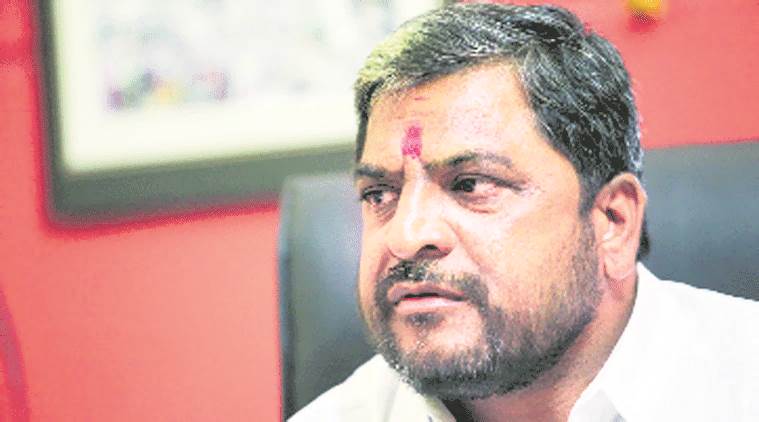 Raju Shetti Shetti, a two-time MP from Kolhapur’s Hatkhanagale constituency
Raju Shetti Shetti, a two-time MP from Kolhapur’s Hatkhanagale constituency
Earlier this week, leaders from more than 30 major opposition parties had assembled in the national capital, at the invitation of the All India Kisan Sangharsh Coordination Committee (AIKSCC), to deliberate over two Bills that the committee had prepared. The Bills, which will be introduced as Private Members’ Bills by Swabhimani Pakhsha MP Raju Shetti and CPI(M) MP K K Ragesh, call for a complete loan waiver for farmers and farmers’ right to guaranteed remunerative minimum support price for agricultural produce. Both the Bills came about after deliberation between 193 farmers’ organisations. Shetti, a two-time MP from Kolhapur’s Hatkhanagale constituency, spoke to The Indian Express about ongoing efforts towards building a farmers’ vote bank.
What is the significance of the whole opposition coming together for farmers’ causes, and is this the first time such a mobilisation has happened?
Attempts to create a political consensus around agrarian issues have been made in the past, but such efforts were not successful. The creation of a vote bank, or even political dialogue, around the subject is difficult for many reasons. In India, the fragmentation of farmers is myriad, and it is difficult for them to come together. Taking advantage of this, political parties have, so far, refused to address farmers as a single unit or a vote bank, and instead, kept them divided on the lines of caste, creed and region, among others.
For the political leadership, the angst of the consumer is more important than the distress of the farmer for the simple reason that the former is united. For example, if prices of onions cross a certain threshold, then consumers from Kashmir to Kanyakumari will be united, but the same will not be the case if wholesale prices of onions fall. Then, only the onion grower would become vocal. This lack of cohesion between the growers is a major hurdle for the formation of a farmers’ vote bank, or for political parties to take up agrarian issues at the national level. So, this would be the first time that all farmers’ leaders have come together on the same platform and compelled political parties to listen. In the run-up to the 2014 general elections, issues like black money and corruption were on the agenda, but the 2019 elections will be fought on farmers’ issues.
How was this unity achieved? What were the common causes that made the farmers unite?
Under the banner of AIKSCC, farmers’ leaders have been working towards getting all farmers together on common issues. The task was challenging, given the deep and often rigid differences. Our committee had representation from groups who were opposed to globalisation, as well as from groups that welcomed it. During discussions, two points emerged on which all of us agreed: The demand for complete loan waiver for farmers and the implementation of the M S Swaminathan Commission’s recommendations, which assured remunerations equal to 1.5 times the production cost. During discussions, farmer leaders came to the conclusion that the present indebtedness was due to poor prices. So, till remunerative returns are assured, we will not be free of the vicious cycle of unending loans.
The incidents of farmers being shot dead at Mandsaur, Madhya Pradesh, had also acted as a clarion call for all farmers’ leaders to forget their differences and join forces. We understood that if we remained fragmented, we would not be able to get justice for our cause. Our demand for loan waiver is based on facts. Recently, the government has announced the Seventh Pay Commission, and government servants were to get arrears as well. In our case, the farmers are in debt as they have not been able to get remunerative prices. The recommendations of the Swaminathan Commission were given in 2005, but not a single government has implemented them. So, farmers are asking for a complete loan waiver.
Why were only opposition leaders invited for the discussions? What is the next step?
Our movement is for farmers, and we will go with any political party which assures us of meeting our two main demands. In a democratic set up, the present day opposition party is the future government, and thus, we need to maintain a dialogue with them to ensure our demands are met. The present government has, unfortunately, let farmers down, and we cannot believe them till they directly implement our suggestions.
How will you keep the momentum of the movement going till the elections?
In Maharashtra, I will soon embark on a state-wide yatra to raise awareness amongst farmers. With prices of each and every commodity at an all-time low, we will be talking to farmers and telling them not to get disheartened. We will tell our farmers that we are trying to create a viable alternative to the BJP, and that they should support us. At this hour of need, we will tell them to be with us and not to take the extreme step of committing suicide.
Farmers’ leaders have realised that while we are not strong enough to form a government, we can play the crucial role of a pivot, and swing the balance of power. All our efforts will now be directed towards strengthening that role.